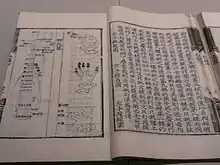어미
Korean
Etymology 1
First attested in the Seokbo sangjeol (釋譜詳節 / 석보상절), 1447, as Middle Korean 어〮미 (Yale: émì). Related to 어머니 (eomeoni, “mother”), 엄마 (eomma, “mom”).
Pronunciation
- (SK Standard/Seoul) IPA(key): [ʌ̹mi]
- Phonetic hangul: [어미]
| Romanizations | |
|---|---|
| Revised Romanization? | eomi |
| Revised Romanization (translit.)? | eomi |
| McCune–Reischauer? | ŏmi |
| Yale Romanization? | emi |
Noun
어미 • (eomi)
- (often impolite) mother
- 어미 속 좀 그만 썩여라.
- eomi sok jom geuman sseogyeora.
- Don't make mum worry too much.
- A casual way used by a father to address his wife in front of elders.
- 영철이 어미는 도대체 어디를 나갔습니까?
- yeongcheori eomineun dodaeche eodireul nagatseumnikka?
- Where the hell did Yeongcheol's mother go?
- dam; mother animal
- 어미 호랑이
- eomi horang'i
- mother tiger
- mother of one's grandchild (or child in further generations)
- Term of address for one's daughter or daughter-in-law (who has children).
Etymology 2
Sino-Korean word from 語尾
Pronunciation
- (SK Standard/Seoul) IPA(key): [ˈɘ(ː)mi]
- Phonetic hangul: [어(ː)미]
- Though still prescribed in Standard Korean, most speakers in both Koreas no longer distinguish vowel length.
| Romanizations | |
|---|---|
| Revised Romanization? | eomi |
| Revised Romanization (translit.)? | eomi |
| McCune–Reischauer? | ŏmi |
| Yale Romanization? | ēmi |
Synonyms
- 씨끝 (ssikkeut)
Pronunciation
- (SK Standard/Seoul) IPA(key): [ʌ̹mi]
- Phonetic hangul: [어미]
| Romanizations | |
|---|---|
| Revised Romanization? | eomi |
| Revised Romanization (translit.)? | eomi |
| McCune–Reischauer? | ŏmi |
| Yale Romanization? | emi |
Noun
어미 • (eomi) (hanja 魚尾)
- (publishing, bibliography) V-shaped decoration that appears in the middle of a traditional East Asian-style book leaf
- Holonym: 판심(版心) (pansim)
This article is issued from Wiktionary. The text is licensed under Creative Commons - Attribution - Sharealike. Additional terms may apply for the media files.
